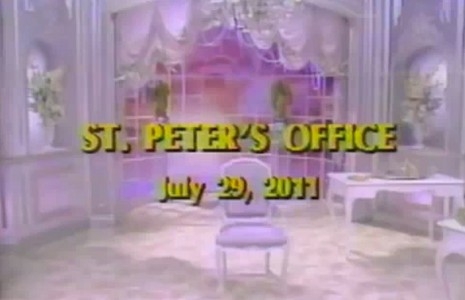
Buzzfeed have found this clip from the series Second Chance, which seemingly predicted the correct year of Colonel Gaddafi’s death.
Yep, it’s Friday.
Via Buzzfeed

Buzzfeed have found this clip from the series Second Chance, which seemingly predicted the correct year of Colonel Gaddafi’s death.
Yep, it’s Friday.
Via Buzzfeed
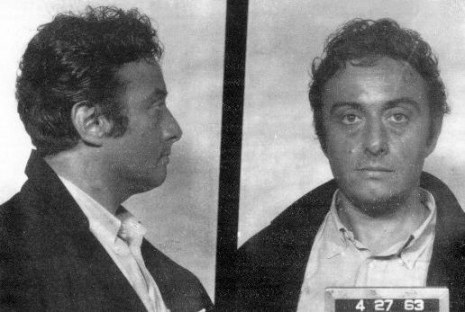
The man who spawned modern comedy, Lenny Bruce was born today in 1925. Instead of a selection of his well-known monologues from stage and TV appearances, here is Dance Hall Racket, a low budget exploitation movie, which Bruce wrote and starred in, alongside his wife Honey Harlow, and Timothy Farrell as Umberto Scialli.
Produced by George Weiss (best known as the producer of Ed Wood’s Glen or Glenda?), Dance Hall Racket was the third of the Umberto Scialli films, following on from Devil’s Sleep and Racket Girls, in which Scialli was killed. Dance Hall Racket is a quirky, trashy, Z-movie, and leaves no clue to the Lenny Bruce who would, within the decade, start a revolution in comedy.
Bonus clips, Lenny sings and on-stage, after the jump…
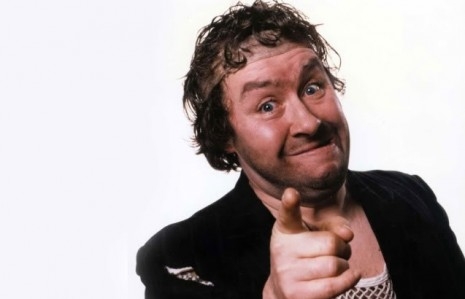
It was a little after three o’clock on a Saturday afternoon, when the dark green Cherokee jeep, loaded with canisters of propane gas, hurtled towards the Departure zone at Glasgow International Airport. The driver was saying prayers and asking for god’s help, when his vehicle hit security bollards and burst into flames. 28-year-old, Kafeel Ahmed had intended that the jeep would crash through the glass doors, enter into the airport concourse, where it would blow-up, killing as many of the men, women and children who queued patiently for their holiday flights.
It was June 30 2007, and this was the first terrorist attack in Scotland since PanAm Flight 103 exploded over Lockerbie in 1988. Little could Ahmed, or his co-conspirator Dr. Bilal Abdullah, have known that their actions were not to lead to holy martyrdom, but rather to the resurrection of one of the funniest, most popular and successful comedy creations of the last 50 years.
In a hotel room in Budapest, the writer Ian Pattison watched the images beamed from Glasgow onto a flickering TV screen, as the would-be terrorists were arrested, all Pattison could think of was one question: “What would Rab C Nesbitt make of this?”
Fall, present day, the trees are cashing in their savings, and the streets are covered with gold. I meet Ian in a coffee house, in Glasgow’s West End, a background of children and mothers laughing and chatting, and the hiss of an espresso machine. It’s a clear day, and we have a long sweeping view down to the Clyde and across the water to the high rises and tenements of Govan beyond, home to the fictional Rab C. Nesbitt - “the original unemployed man”, whose comic television adventures have brought national acclaim, incredible viewing figures and a cabinet full of awards.
Pattison looks relaxed, toned and much younger than his grey hair implies, and he must be older than he looks for It’s twenty-five years since he first dreamt up the alcoholic, head-bandaged street philosopher Rab C. Nesbitt:
“It was New Year’s Eve,” recalls Pattison, “And I was married and living in this masionette apartment in the north of England. Now I’m an anti-social person and when the front doorbell went, I said to my then wife, ‘That’ll be them from downstairs coming to First Foot, I don’t want to see these people. You entertain them, give them a drink and send them on their way. I’ll go upstairs and you tell them I’m in Glasgow.’
“I go upstairs to ‘Glasgow’, but wives don’t always do what you ask them, and these two neighbors sat there until about 5am knocking back the swally. I was upstairs fuming, wondering what can I do? I just can’t suddenly materialize – I’m in Glasgow!
“So I had a notebook up there, because I used write in the wee room, and I started trying to write something about a Liverpool councilor, but it wasn’t working. Then suddenly, I don’t know why, this mutated into a Glasgow speech rhythm, and in about 10 minutes I’d written the first Nesbitt monologue.
“I’ve no idea where it came from. All I knew about him was he raved, he had a head bandage and wore trainers.””
It was a piece of genius inspiration and Ian passed it on to Colin Gilbert, producer of the sketch show Naked Video. Gilbert liked it, but the actor chosen to play the part, Gregor Fisher, wasn’t so keen.
“There was no inkling of developing the character. I just knew it was a character piece, that is to say you weren’t going from gag to gag to gag. I just knew if it got into Gregor’s hands, I knew what he could do with it, and how he would play it. The trouble was persuading Gregor to do it.”
Anyone who has seen Fisher’s work will know that he is a brilliantly gifted actor, with a warmth and subtlety most Hollywood actors would pawn their looks to possess. I first saw Fisher as an unforgettable, happy-go-lucky, wide-boy in Peter MacDougall’s brilliant Just a Boy’s Game, then a few years later stealing the crappy eighties version of 1984 with a cameo role from under the noses of Richard Burton and John Hurt.
Now Naked Video had made Fisher a household name, on the back of his incredible comic acting, but when presented with a new character to play, he was less than impressed by Pattison’s latest creation.
“Gregor read it and said it was as funny as cancer,” Pattison recalls.
Thankfully, Head of the Comedy Unit, Colin Gilbert was on hand to quietly help matters along. Gilbert is a legend in TV comedy, with a long list of ground-breaking shows from Nesbitt to The Limmy Show, Still Game and Gary - Tank Commander on his long and impressive CV. Indeed, Gilbert with his white hair and beard and twinkling eyes is a polar bear disguised as a man - he may look nice and cuddly, but underneath you know there is this formidable energy just waiting for its moment.
“Colin quietly insisted, and Gregor tried it 2 or 3 times, and by the third time, I think Gregor began to think maybe I’m wrongish, and we never thought any more about it. But when the show went out, people picked up on this drunk character, largely because of Gregor’s eye-catching performance.”
Rab C Nesbitt returns to BBC 2 for 6 weeks from Wednesday 5th October at 22:00 hours
The full interview with Ian Pattison and more from Rab C Nesbitt, after the jump…
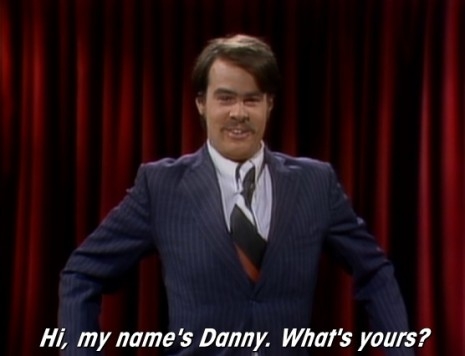
The lovely Dan Aykroyd runs through a selection of voices in search of a punchline, in his screen test for Saturday Night Live from 1975. It’s an impressive turn, showing his considerable talent, versatility, and a mustache that made him look older than his twenty-two years of age.
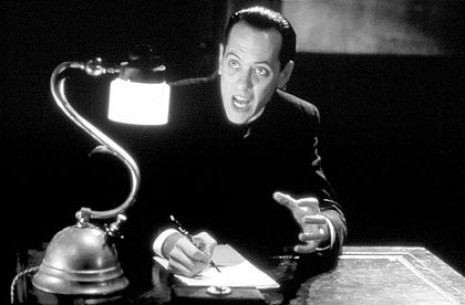
This is an excellent short film, Franz Kafka’s It’s A Wonderful Life, written and directed by the immensely talented Peter Capaldi. It stars Richard E. Grant, Elaine Collins, Phyllis Logan, Cripin Letts and Ken Stott, and is a comedy about Kafka’s frustrations in writing Metamorphosis - with a little nod towards the work of Frank Capra. This was a deserved Oscar winner back in 1995, for best short film, and Capaldi is now better known for his foul-mouthed Maloclm Tucker form The Thick of It. One hopes he will return to writing and directing soon.
The rest of ‘Franz Kafka…’ plus the best of Capaldi as the foul mouthed Malcolm Tucker - NSFW, after the jump….
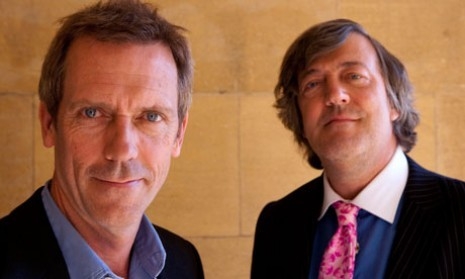
I wonder why it’s generally the rich and famous who like to tell the public, ‘Money does not bring happiness’? It’s so condescending. Do the poor wander around informing whoever will listen, ‘Poverty does not make you happy’? Hardly. I was thinking about this as I finished reading Stephen Fry’s latest volume of highly readable autobiography, where the great man informs us:
I know that money, power, prestige and fame do not bring happiness. If history teaches us anything it teaches us that. You know it. Everybody agrees this to be a manifest truth so self-evident as to need no repetition. What is strange to me is that, despite the fact that the world knows this, it does not want to know it and it chooses almost always to behave as of it were not true. It does not suit the world to hear that people who are leading a high life an enviable life, a privileged life are as miserable most days as anybody else, despite the fact that it must be obvious they would be - given that we are all agreed that money and fame do not bring happiness. Instead the world would prefer to enjoy the idea, against what it knows to be true, that wealth and fame do in fact insulate and protect against misery and it would rather we shut up if we are planning to indicate otherwise.
It’s a clever piece of writing, and rather troubling. If money hasn’t made Mr Fry happy, perhaps that’s because he wasn’t happy before he had it? As someone who has spent a considerable part of his adult life in poverty, dirt and a miserable ease, I can assure the universally loved writer, actor, broadcaster and tweeter that money can and does bring happiness, for it allows independence. Moreover, if money’s not important, then why is so much of our politics based on the redistribution of wealth?
Of course, it’s not just money, Mr Fry is writing about, but fame, and his depression, and all that entails, which he recently discussed, along with his thoughts on suicide, in the talk-show In Confidence:
‘It is exhausting knowing that most of the time the phone rings, most of the time there’s an email, most of the time there’s a letter, someone wants something of you. They want to touch the hem of the fame, not the hem of the person.
‘You resort to not travelling on the Tube or walking round the street any more and going in a big car with a driver.
‘And people think, “Oh, he thinks he’s so grand, doesn’t he?” Well, no. I’d rather walk, but sometimes I just can’t.
‘I feel I would love to close down for a number of years in some way and just be in the country making pork pies and chutneys and never have to poke my head out of the parapet.’
In 1989, I had the pleasure of meeting Fry, when I was a researcher working on Open to Question, a “yoof” interview series where groups of inquizzitive teenagers grilled various invited guests: from politicians (Gary Hart, Tony Benn), through performers (Billy Connolly, Jim Kerr) to Royalty (Princess Anne). Fry’s show was recorded on the same day we filmed an episode with Yusuf Islam (aka Cat Stevens), in which the seventies pop star discussed the fatwa on Salman Rushdie and his Islamic beliefs. In one corner of the green room was Fry with cigarettes and red wine, in the other Yusuf Islam with an entourage of veiled assistants.
Fry was affable, eminently likable, terribly polite and deflected the most intimate and probing questions. When asked if he had always wanted fame, Fry avoided a direct answer by explaining his definitions of fame. There was “real fame like Charlie Chaplin”; and another kind, like original James Bond (on radio) and British TV host, Bob Holness. Fry said when he was younger he wanted to be famous like Holness, and managed to slip this in without the interviewer, (future Channel 4 newsreader) Krishnan Guru-Murthy picking up on his youthful ambition.
In The Fry Chronicles, he explained this ambition more openly:
A part of me - I have to confess this, moronic, puerile and cheap as it may sound - really did ache to be a star. I wanted to be famous, admired, stared at, known, applauded and liked.
Now of course he’s bigger than Holness and as universally loved as Chaplin, which in light of his recent comments about hem-touching fans, does, sadly, seem to confirm what Saint Teresa of Avila once wrote:
“More tears are shed over answered prayers than unanswered ones”
It’s thirty years since the loveliness that is Stephen Fry first came to prominence alongside Emma Thompson, Hugh Laurie, Tony Slattery, Paul Shearer and Penny Dwyer in the Cambridge Footlights’ comedy revue “The Cellar Tapes”. It’s the last really great Footlights show, as those following it may have highlighted some great individual talent (Sue Perkins, Robert Webb, David Mitchell, and Richard Ayoade) but never achieved the legendary status of “Beyond the Fringe”, “A Clump of Plinths” (aka “Cambridge Circus”) or “The Cellar Tapes”. Understandable, you may say, considering the unique and exquisite talents felicitously brought together for our entertainment.
The success of “The Cellar Tapes” led Fry and Laurie to be asked by the BBC to come up with a pilot for a possible series:
We conceived a series that was to be called The Crystal Cube, a mock serious magazine programme that for each edition would investigate some phenomenon or other: every week we would ‘go through the crystal cube’. Hugh, Emma, Paul Shearer and I were to be regulars and we would call upon a cast of semi-regular guests to play other parts.
This is that pilot, in all its VHS glory, and as someone comments on the youtube page was there a more brilliant threesome as Fry, Laurie and Thompson? Answers on a postcard, care of the usual address.
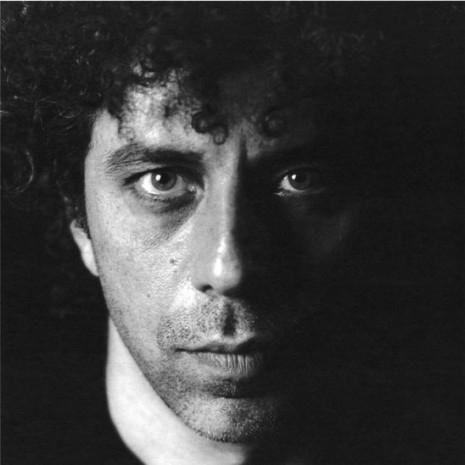
In the Fall of 1982, Eric Bogosian traveled to Britain, where he performed in his two solo shows Men Inside and Voices of America. His tour took him from London’s ICA, through Cardiff, Newcastle-Upon-Tyne, Middlesborough, to Glasgow and Edinburgh, during the months of October and November , traveling with just one small suitcase of clothes, a black wool overcoat, and a selection of paperbacks to keep him company. Quite a feat at a time when things were organized without the advantage of the internet, emails, texts or mobile phones. It reveals much about Bogosian’s ambition and self-belief, as it does about his talents.
Bogosian had opened Men Inside and Voices of America that Fall, at the Martinson Hall in New York, where he was hailed as “the best performance artist I’ve yet seen,” by Valentin Tatransky in Arts Magazine. He had also been described as like “a man possessed, a medium, a schizophrenic,” by Sally Banes in the Village Voice, and as someone who could “perform the performer, and out-perform the performance artist,” in Flash Art.
At the time, I was a student, avoiding studies while editing the university magazine. How I’d heard about him, I can’t recall, a press release or flier most likely - my life back then seemed lived from the inside of an aquarium - knowledge, happiness, love and success were always beyond the glass. This disengagement with the external world might explain why I turned up late after his first show at the Third Eye Center, on Sauchiehall Street. Understandably, he was pissed, but I made my excuses and walked him back to his hotel on Cambridge Street, with arrangements to see and meet the following night in Edinburgh. These then are extracts from that interview.
Bogosian performed in a small stage area, surrounded by raised seating. He was imposing, for such a compact figure in black shirt, black pants. A bare stage except for one chair. Everything was suggested, created, from Bogosian’s physical presence. He walked onto stage and became a small child flying as Superman, talking to his father, mimicking adult bigotry before, shockingly, breaking into a stutter. So began the darkly comic Men Inside a carnival of souls from a troubled America - dysfunctional men, unable to interact with the world because of their bigotry and hate.
From Superman, Bogosian became a young man masturbating before declaiming his loneliness by saying “I love you” to a centerfold. Then on to a bored teenager, a stud, a bully, a sleaze-ball, a down-and-out, a Blood and Sword evangelist. It was loud, noisy and funny. Bogosian’s performance was as brilliant as his characters were low:
“Each character, each scene, flows into the next presenting different aspects of man gone wrong: his sexism, his racism, his hate.
It’s my effort on my part to try to communicate from a man’s point of view, trying to be sympathetic to men, saying this is how it happens, this is how a man ends up with these perspectives about women, about life - what can we do about it?
The thing I’m trying to lay out on women is the whole discussion of Women’s Liberation, Feminism, and the like, is all very complicated and that’s the first thing - it’s a complex issue, it’s not black and white. Women are perfectly justified in complaining about their situation, however, in different times men have also been put into situations that are not so great, the biggest one I can think about is certainly war.
War is Hell on Earth, and nobody should ever have to go through that. And of course, now, here in Great Britain people are thinking of the Falklands thing. I mean, it has to be thought about, if anything is sexist, it’s men should have to go off and die, that is sexist thing too. All I’m saying, we’re all people, let’s try and be a little sympathetic to each other, while we try to find out what exactly is going on.
I was in a restaurant on a Sunday morning in Vancouver, on tour, and I came in and had my breakfast around 10 o’clock in the morning, and there was all these men in the place, all by themselves: smoking a cigarette, reading a paper, eating a breakfast, looking kinda glum, kinda down. And these two couple came in, both in their sixties, and each guy was very dapperly dressed with his wife. And the women were happily chatting with each other and the men were sort of ushering their wives in. And you had a very strong feeling that these women were in some way protecting these guys, they were giving them something to do with themselves, yeah know. They weren’t like every other guy in this place, and you got the feeling that these guys were kinda looking across at these two couples, how these guys’ clothes were clean, their clothes were pressed, and how, how they had something to fucking do.
And all those other guys were just crumpled up pieces of paper. And here are these two guys, who because they stuck it out with a couple of marriages, now that they were in their sixties, had something to do. And somehow I wish people would admit this: that mean and women are different, and that for whatever reasons, whether they’re cultural or whatever, they are complimentary aspects of one another.
Bogosian was concerned that some of the Scottish audience was offended by certain aspects of his performance thinking they may have confused the views of the characters with the performer’s. After all, this was dangerous stuff to bring to a city more attuned to the Royal Lyceum’s revival of Noel Coward, than an act billed as a cross between Lenny Bruce and Richard Pryor.
“I don’t expect anyone to be so critical about performance or experimental theater as I have been. I mean, it’s my life, it’s all I’ve been doing for the past 12-13 years, it’s all I’ve been doing - working in theater and complex theater. I don’t expect everyone who walks in off the street to understand about that - they’re taking it at face value, and they may not even notice the technique I’m employing.
For instance, the exotic dancer and the Led Zeppelin thing seem very alike, but their movements are very complex. You just can’t jump out and do that stuff, it’s all choreographed, and all rehearsed a lot, it’s just subtle. Someone might watch and go, ‘Hmm, not bad, that’s good movement.’ But not everyone’s going to understand that, what it’s about. They’re going to go ‘Ha-ha. look at that, he’s playing guitar,’ you know?
I can’t say if that’s something formal or theoretical in my work, it’s just something I’ve always done as an actor. It comes through from the inside. I don’t think any good actor can explain what happens when they become Someone. I become them totally and I know I’m inside them, and somehow it reads, and that’s the funny thing because at acting school they teach you how to relate what’s going on inside your head to what you look like outside. I don’t know what I look like, I’ve seen photos and stuff, but somehow what I look like is corresponding to what I’m feeling.
In a way that’s very direct and without any real training on it, I just hit the stage and it starts happening to me. But that’s just me, it’s like something I’ve got to my advantage, that I should make the best use of.”
The second half of the show was Voices of America a relentless tour of America’s airwaves, where every speaker, no matter how cheery or inane, seemed obsessed with death:
“If you had a choice to die from a nuclear holocaust (oh no!) or, a heroin overdose (oh wow!), which would you choose?” - ‘Voices of America’
This was all very much a hint of Bogosian’s Barry Champlain in Oliver Stone’s Talk Radio.
“Voices of America started out as a sort of finger exercise, so I could practice my voice, and it ended up as a piece.
At the time I was trying to get into advertising, so I made this demo tape of adverts and jingles and stuff, but the company thought it too cynical.
It’s very black. I’m interested in the way society’s fascinated with the lives of its stars and superstars, with its violence and consumption, its decadence.
Like how Keith Richard’s habits became published or how real death and real suffering are treated. How things are mass produced indifferently, and people’s suffering doesn’t come through, but is just forgotten.
Though I don’t think my philosophy or my ideas about anything are social or profound or anything, they’re just basic, mundane, liberal ideas, what we call liberal in America. It’s just like everyone else should be nice to everyone else, and how you can do it and go vote and I’m against the death penalty and for social programs. It’s just dumb stuff - I don’t mean these things are dumb - I mean I’ve got nothing to tell anybody that they shouldn’t already know. I’m just making stuff I’m interested in, it’s the piece I’m interested in - how can construct them and how can I act them out, it’s just all that stuff is in my head and it all might as well come out in the show, it might as well be there, as not be there.
And I know they’ll never put me on TV for saying these things, that’s the funny thing about it: I don’t think there’s anything radical about what I’m saying or doing, but they’ll never put me on a TV station saying this kind of stuff.
The current comedians in the States are just zany, they’re just crazy guys. Comedians with a conscience are not wanted in the mass media.
It’s just intuitive, a whole set of things are interesting to me, things that operate in my life. It’s like my face, if I get a nose job, and get my nose to be straight and my chin to be stuck out and stuff like that.
If I’m eloquent in expressing my particular set of perameters in my frame of mind they start to seem universal, or interesting or something like that, or, somebody at least might identify with them. I don’t start off with a theory and try to work it all out, it’s just that I try to express myself as best I can.”
Later, we walked out into the Georgian cobbled streets of Edinburgh’s New Town. It was late and cold, and the evening’s silence reminded us of our own past experiences of walking around empty streets at night listening for parties to crash.
Bonus clips of Eric Bogosian in performance, after the jump…
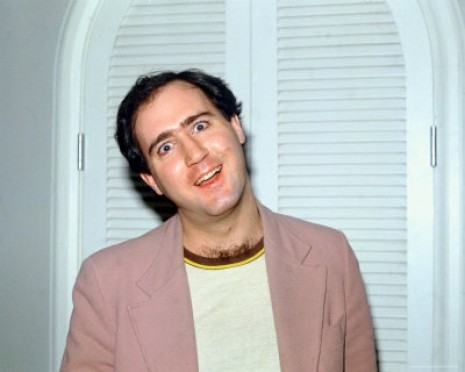
Ah, this is delightful. Andy Kaufman’s Midnight Special an episode of Burt Sugarman’s Midnight Special, hosted by Wolfman Jack, which aired on January 23, 1981. If you ever wondered what the hell Kaufman was about, well, he tries to answer this here, as he discusses what is serious, what is comic, what is real and what is not. There are also performances from most of his best known characters, “The Foreign Guy,” Tony Clifton, “Ladies Wrestling,” the ventriloquist act, and of course, Elvis.
It’s brilliant, funny and (at its time) ground-breaking. Has anyone has come close since? No. Kaufman was a one-off, and this program highlights why he was so good. Enjoy.
Previously on DM
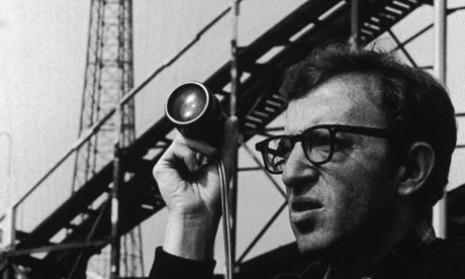
Woody Allen’s dialog from Hannah and Her Sisters almost fits perfectly into this scene from Taxi Driver, with Robert De Niro and Cybill Shepherd. It works so well that it even presages what we know happens in Martin Scorsese’s film
“A week ago I bought a rifle. If I had a tumor, I was gonna kill myself. The thing that might’ve stopped me: My parents would be devastated. I would’ve had to shoot them also.
And my aunt and uncle….It would have been a bloodbath…...I need answers. Otherwise, I’m gonna do something drastic.”
Now if only the Three Stooges had made Goodfellas.
Previously on DM:
James Coco: Overt hostility disguised as comedy disguised as overt hostility
Bonus clip, Rick Moranis spoofs Dick Cavett and Woody Allen in ‘Taxi Driver’, after the jump..
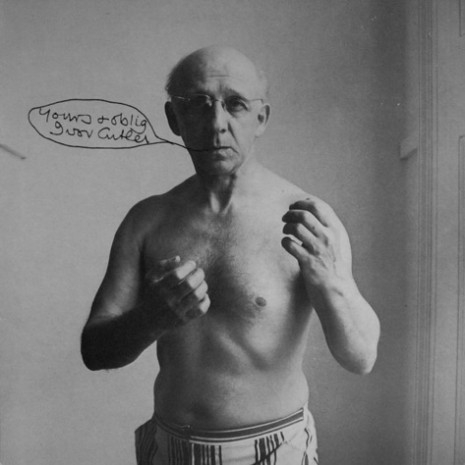
Ivor Cutler was a poet, humorist, singer/song-writer, and performer, who was, by his own admission, “never knowingly understood.” Born into a Jewish middle-class family, in Glasgow’s south side, Cutler claimed his life was shaped by the birth of younger brother:
“He took my place as the center of the Universe. Without that I would not have been so screwed up as I am and therefore as creative. Without a kid brother I would have been quite dull, I think.”
Being so usurped, the young Cutler attempted to bash his brother’s brains in with a poker. Thankfully, an observant aunt stopped him. As more siblings were born, another brother and two sisters, Cutler’s resentment lessened after he discovered poetry and music. When he was five, he discovered politics after witnessing the bare-foot poverty of his school friends, and aligned himself to the Left thereafter.
After school, he worked at various jobs before he settled as a school teacher, teaching 7-11-year-olds music and poetry. His work with children inspired and reinforced his own unique view of the world:
He recalled how, in an art class, “one boy drew an ass that didn’t have four legs, but 14. I asked him why and he said it looked better that way. I wanted to lift him out of his cage and put my arms around him, but my intellect told me not to, which was lucky, because I probably would have been sent to prison.”
In the 1950s, Cutler started submitting his poetry to magazines and radio, and soon became a favorite on the BBC. His poetry was filled with “childlike wonder of the world”, created through the process of “bypassing the intellect.” He was, by his own account, a “stupid genius,” , as the London Times explained
Such genius derived from his ability to view life from the opposite direction to that taken by society, and his ability to empathise with the implications of that viewpoint, as in his one-sentence poem: “A fly crouching in a sandwich cannot comprehend why it has become more than ordinarily vulnerable.”
Cutler had a cult following of loyal fans, which included John Lennon and Paul McCartney, who cast him in their The Magical Mystery Tour film; DJ John Peel, who devotedly played Cutler’s releases; Morrissey and more recently Alan McGee and Oasis.
Ivor Cutler: Looking for Truth with a Pin was made shortly before Cutler died. The program has contributions from Paul McCartney, Robert Wyatt, Billy Connolly and Alex Kapranos, and is a fitting testament to the great man, who made life so much more fun. More interesting. More mysterious.
Admittedly, he might not be everyones cup of warmth, but as Cutler said himself:
“Those who come to my gigs probably see life as a child would. It’s those who are busy making themselves into grown-ups, avoiding being a child — they’re the ones who don’t enjoy it.”
I hope you enjoy.
More truth from Mr Cutler’s pin, after the jump…
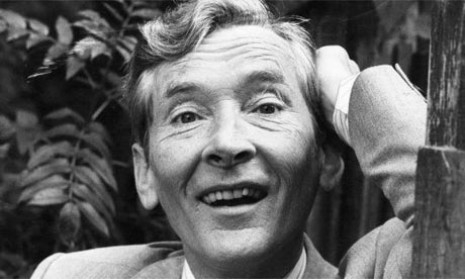
Kenneth Williams was born today in Bingfield Street, London, just off the Caledonian Road, on the 22nd of February 1926. According to his mother, he was born at two-thirty in the afternoon. She later claimed she remembered this, because it was early closing day and her husband had the afternoon off.
Kenneth’s father, Charlie, owned a hairdresser’s and, Kenneth’s mother, Louisa, worked there part-time. Charlie was known for being bluntly outspoken and highly sarcastic to his customers. “Henna dye on your head?” he’d ask incredulously. “Do you want to look like a tart?” Or, “Stick to your own color. You can’t improve on nature. You ought to know that. You’re old enough, and ugly enough.”
If Kenneth owed his refined looks to his mother, then, it was from his father that he inherited his sharp and acerbic tongue.
With only an older sister, Pat, born in 1923, it rested with Kenneth to take over the family business. But Kenneth aspired to things other than a shampoo and set. He had seized upon acting as a possible, future career. However, his father decried his son’s ambitions, acting, he said: “The women are all trollops and the men are nancies.“
While his sister Pat showed prowess as a swimmer and as an athlete, the rather camp Kenneth stuck to books and art.
“I settled for the books and gramophone and an awful lot of talking to myself. My exhibitionism concealed a sense of inadequacy. The real self was a vulnerable quivering thing, which I did not want to reveal; showing-off, affectation and role-playing I used like a hedgehog uses his spines. The facade was not to be penetrated. My parents respected this privacy. ‘He’s up in his room,’ they’d tell visitors. ‘He likes to be on his own,’ and I was undisturbed in my private world where artists were heroes and the imagination was king.”
One of his school reports ended with the word, “Quick to grasp the bones of a subject, slow to develop them.” The young, master Williams ‘”affected indifference” when his father read the report to him. “It sounded like a reluctant vulture on someone else’s prey.” It was at school that Williams developed a talent for mimicking his teachers, something that landed him in trouble more than once. It was the first inkling of Williams’s desperate desire to be liked, and of the possible outcome such mimicry would incur.
The headmaster warned Williams that such “mocking” may win him popularity but that it would also succeed in undermining his own authority. “A facetious front may win you popularity but you won’t be taken seriously when you want to be sincere. People won’t believe you and that will hurt you.” A surprisingly apt prediction.
Kenneth’s need for human companionship saw him attempt to steal away many of his sister’s schoolboy boyfriends. Infuriated by the number of youthful suitors that called for the blossoming Pat, Kenneth merrily told them that his sister was “meeting another bloke” and then, nobly, offered his own services as a date. Such brass-neck inevitably ended in tears.
Previously on DM
Tears of a clown: The Wit and Wisdom of Kenneth Williams
More sex and death from Kenneth Williams, plus bonus clips, after the jump…
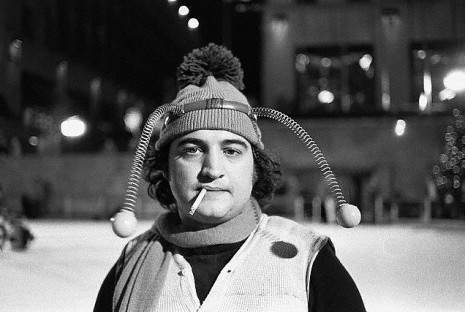
Happy Birthday John Belushi, who would have been 62 today. Born in 1949, Belushi’s big break came in 1971 when he joined The Second City comedy troupe in Chicago. Cast alongside Chevy Chase and Christopher Guest in National Lampoon’s Lemmings (which Richard Metzger wrote a great article on last year), Belushi’s natural comic talents shone. He moved to New York, with his girlfriend Judy Jacklin, and became a regular on the National Lampoon Radio Hour, working with such future Saturday Night Live performers Gilda Radner and Bill Murray. The rest we know.
It’ll be SNL and The Blues Brothers that Belushi will be remembered for best, and watching clips of his TV or film work now, only re-enforces what is so sad about his early demise.
Previously on DM
Bonus clips plus interview with Belushi and Dan Ackroyd after the jump…
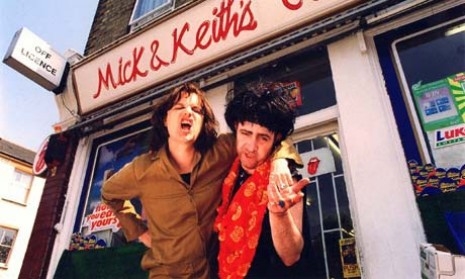
You may think some of your favorite celebrities live the high life in the hills of Hollywood, the townhouses of New York or the chateaux of Switzerland, but you’d be wrong. For most them live in a quiet suburban street in Surbiton, England.
Yes, this is where you’ll find the likes of Michael Caine, Jack Nicholson, Al Pacino, Joe Pesci, Mick Jagger, Keith Richard, David Bowie, Dirk Bogarde, The Beatles, Alfred Hitchcock, Jimmy Savile and many others. Well, that’s what writers and performers, John Sessions and Phil Cornwall would have us believe with their cult comedy series Stella Street.
Pitched as a “suburban soap”, Stella Street combined what we all think we know about the stars with soap opera conventions, to produce such memorable characters as ultra-violent gangster Joe Pesci, effete snob Dirk Bogarde and mind-numbing [soccer] bore Jimmy Hill.
If you’ve ever wondered what it would be like to see Al Pacino and Roger Moore playing Monopoly in Michael Caine’s front room to celebrate Zulu’s 33rd anniversary, or what would happen if a lobotomised Joe Pesci and drunk Jimmy Hill tried to cook a turkey “the way Delia Smith likes it”, Stella Street was the place to find out.
Stella Street was screened on the BBC between 1998 and 2001, with a special in 2004, and was directed by Comic Strip Presents… mastermind, Peter Richardson. If you’ve never been, I’d suggest a visit, for you’re bound to see someone you know. Oh, and Mick and Keith run the local convenience store.
Part 2 of ‘Stella Street’ plus bonus episodes, after the jump…
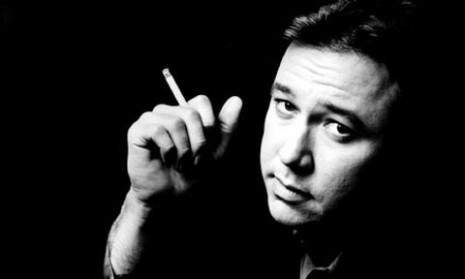
He was the best comedian of his generation, and seventeen years after his untimely death, Bill Hicks is still greatly missed. It’s hard to believe he would have only been fifty this year, which is not old when compared to some of the aged reptiles who hold power in politics, the media and banking. But we were lucky to have had his talents for the short time we did.
Ninja Bachelor Party was written, co-directed and co-produced by Hicks and Kevin Booth, and shot over ten days in Texas for $5,000 in 1990, as a parody of martial arts movies. It isn’t his best work, and falls apart here and there, mainly because Hicks and co. allegedly didn’t take the filming too seriously. Even so, it does have enough to make it that little bit special. And no, there is no bachelor party.
Part deux of ‘Ninja Bachelor Party’ after the jump…
With thanks to William Baird
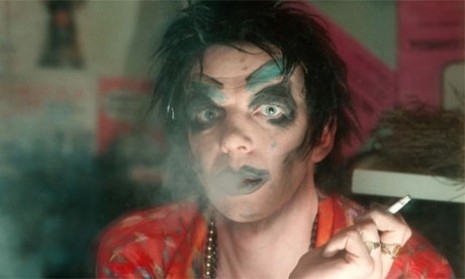
The cost was a nervous breakdown - contemplating the wallpaper: “Just rocking to and fro, you know, the days merging, the seasons coming and going.” It’s David Hoyle talking to London’s Time Out magazine back in 2006. Hoyle is a performance artist, actor, and writer, he was talking about the cost of being The Divine David - his caustic alter-ego.
“In a way the Divine David became the patron saint of decadence and nihilism and all the rest of it, and it’s hard for that not to affect your own actions,” Hoyle recalls. In the end, he felt, the character was doing him more harm than good. “As much as I used to say, ‘Oh yes, you have to be very sure of your identity to be doing all this business,’ I don’t think I actually was. If you’re used to creating aliases and camouflage and all that sort of palaver, eventually you have to peel it all away and work out who you are.”
The Divine David Presents first appeared on British TV screens in 1999, and offered a series of his thoughts, views, pastiches and whatever came into his head about lile, sex and everything in between. Television was never to be the same again for The Divine David pushed boundaries and challenged perceptions - wait, that description is the kind of media cliche The Divine David would hate - let’s just say he fucked with his audience, and sometimes he fucked with himself, as he once explained to Joe Coleman:
DD: I’m very suspicious of actors and actresses… anything that I do as Divine David is not acting, it’s being. When I say something like ‘I’d like to stab you in the neck’, I really mean it. I said I wanted to rip people’s spines out so they could make attractive pendants and earrings…
IW: David has done a performance where he tried to rip his own spine out on stage…
DD: I just decided ‘I’m gonna do it’, I had Siouxsie and The Banshees singing Through the Looking Glass: “even the greatest stars dislike themselves in the looking glass”. I was laughing my head off. I broke a glass and thought “I’ll shove in it my back and try to rip my spine out”, so I just got it and shoved it in… there were people being sick… it challenged their ideas of themselves to such an extent. But I think that, ultimately, can be quite liberating.
His TV series on Channel 4 brought him some mainstream success, but Hoyle was “mired in drink and drugs,” and to save himself, decided to kill off The Divine David in an ice-show spectacular at the Streatham Ice Arena in London. He then moved back to Manchester, “At the end I was pretty burnt out.” And that’s when the breakdown happened.
Hoyle was born in Blackpool, the seaside city famed for its lights, its shows, its candy rock, its kiss-me-quick hats and its Tower. As a gay child, living in Blackpool was “horrendous. Going to school everyday was like “was like walking to your death on a daily basis. Knowing that you were going to get assaulted, knowing that you didn’t have anybody to talk to.” As he told The Times there was no one to turn to, even his teachers were unsympathetic:
“They would watch as my bag was emptied out of the window, three storeys up. They would allow it because they believed that by subjecting me to violence it would make me heterosexual. Your life is a nightmare but you can’t tell them why, because what you are is so massively wrong that what people are doing by assaulting you is the right thing. You should be assaulted for being a homosexual. That’s what was going on in my mind.”
Hoyle coped by turning his pain into comedy. At 17 he made his stage debut at a working men’s club, the Belle Vue.
“I created this character who was the illegitimate offspring of the Duke of Edinburgh and Dorothy Squires. His name was Paul Munnery-Vain, taken from the pulmonary vein in your heart.”
He was a success, and you know the rest was…as they say, and started Hoyle onto his brilliant career.
Then in the 1990s, Hoyle developed the Divine David, a “queer cultural terrorist,” who satirized the lifestyles many of his audiences held dear - gay-community narcissism, the chauvinism of drag artists, sexual politics, celebrity culture and sex. Hoyle was not just mining the world around him, but using up large chunks of himself - and it came at a cost.
Six years after Divine David’s death-on-ice, David Hoyle returned to “straight” performance, and world domination with more brutal, brilliant, emotionally charged and bitingly funny shows. As the writer Paul Darling recently commented, “David Hoyle is a political/comic/philosophical/poetic GENIUS and we’re lucky to have him.”
And here’s where it started with Hoyle as The Divine David.
More Divine David and Bonus Clips of David Hoyle at home after the jump..